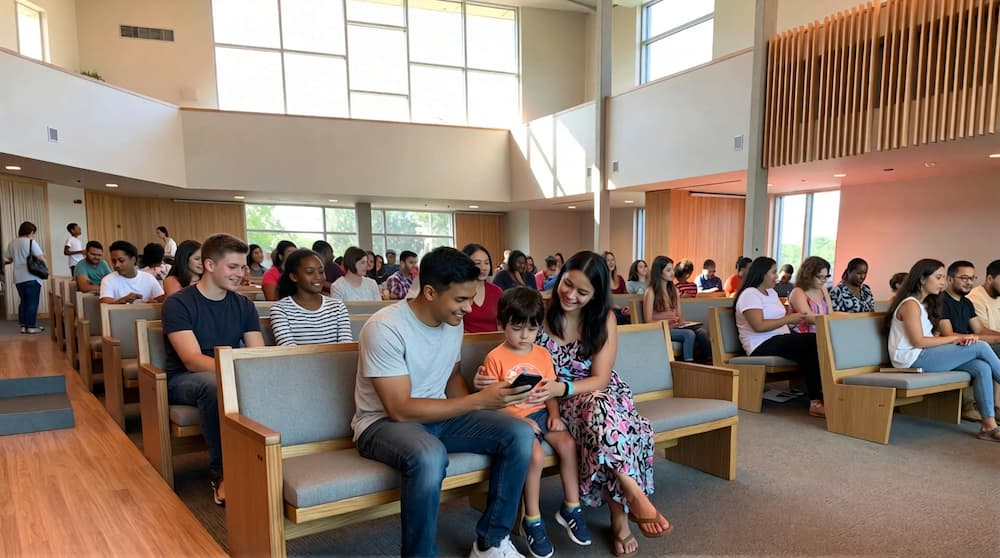How Christian Entrepreneurs Change The World
Wonder how Christian entrepreneurs teach the Word of God? We'll explain how entrepreneurs can use their business to make disciples. Read here!

Paul understood something I think a lot of us get wrong today: that discipleship begins well before someone becomes a Christian.
Too often today we see discipleship as only the process by which existing Christians become more Christlike : you “pray the prayer,” fill out a card in the back of a pew, and someone from the church contacts you to “be discipled” by a more mature believer. This doesn’t appear to be how Jesus thought about creating disciples.
In his first exchange with the apostles, he said, “Follow me, and I will make you fishers of men” (Matt. 4:19). It would be another three years before we could say the apostles had a “conversion” experience, but Jesus was discipling them from the very beginning, intentionally investing in these men for the purpose of making them more like him.
Paul, “called to be an apostle of Christ Jesus,” understood Jesus’s model for discipleship and used his tent making company to carry it out, first by loving people, then by speaking the gospel, and finally by teaching the Word.
#1. Build relationships with people
After Paul’s dramatic conversion experience on the road to Damascus, his contemporaries would have understood if he abandoned his tent making business to spread the gospel as a full-time, donor-supported missionary.
As 1 Corinthians 9 shows us, that was certainly an option for Paul, but he chose to create disciples as he was going about his work as a Christian entrepreneur.
Why?
Mark Russell provides excellent insight into Paul’s thinking here in The Missional Entrepreneur:
Paul sought to build real-world relationships.
He wanted to develop relationships with people because he knew that this is how the [gospel] is spread. He used all of the connections available in the vast network of company and business relationships to promote and spread the gospel.
Paul said, “I have become all things to all men, so that by all possible means I might save some” (1 Cor. 9:22). This quote concludes his explanation and justification of why he did not work as a donor-supported minister. This shows that Paul did not do this because he had to or because he wanted to—rather this was Paul’s strategy!
According to the obvious flow of this passage, this is Paul’s climactic reason for working rather than taking support. He worked in order to become all things to all people.
Paul viewed his company as a vehicle to build relationships with people, both Christians and non-Christians alike. Paul knew that the gospel must be spoken to non-Christians and continually taught to believers, but he also knew that it must first be lived out through love of his fellow man.
Just as Jesus broke bread with his disciples, worked alongside them, and spent time simply conversing with them, Paul understood that in order to properly communicate the gospel with words, he would first have to do it with actions, loving the people around him and modeling Christian character.
#2. Share the gospel with the world
While Paul was intentional about first loving those he worked with, he also knew that it was necessary to speak the gospel in words and express his faith. There’s an old saying, often attributed to St. Francis, that says, “Preach the gospel always; if necessary use words.” In the words of the authors of The Gospel at Work:
“That sounds nice but it’s nonsense. You have to use words if you want to preach the gospel. After all, it’s good news. And sharing news requires words.”
I couldn’t have said it better myself, and I think Paul would agree.
Dr. T. G. Soares writes that New Testament accounts of Paul’s ministry “suggest the constant personal evangelism that Paul must have carried on during his hours of labor with the various fellow-workers with whom he was thrown into companionship.”
Paul lived out the gospel, demonstrating the love of Jesus Christ to those he worked with. But he also undoubtedly used words to explain why he lived the way he did, speaking gospel truth to non-Christians he worked with, bringing them to saving faith in Christ.
#3. Teach the Word of God
Finally, Paul provides a model for what it looks like to use our work as Christian entrepreneurs to continually teach the Word of God to fellow believers, discipling them to become more like God.
Upon arriving in Corinth from Athens, Paul met a husband and wife team of fellow tentmakers named Aquila and Priscilla. Because of their common business and belief in Jesus Christ, Paul stayed with the couple and worked alongside them. Again, Russell is worth quoting at some length:
When Priscilla and Aquila met Paul they were probably already Christians. However, undoubtedly Paul took them deeper in the faith. It is very possible that Paul taught them how to blend workplace excellence and effective evangelism. They became tentmaking missionaries themselves, traveling on to Ephesus no doubt still practicing their trade and teaching the Way to people like Apollos. Paul modeled teaching in the context of daily life, which made spiritual instruction seem natural and flowing rather than forced and uncomfortable as it is commonly perceived.
The apostle Paul provides a model for us to follow as we seek to create Christian entrepreneurs through our own endeavors, live out the gospel by loving people and building genuine relationships, speak the gospel with words, and teach the Word to fellow believers so that Christians might live more like Christ over time.
Editor's note: This post was adapted from Called to Create: A Biblical Invitation to Create, Innovate, and Risk by Jordan Raynor. Baker Books, a division of Baker Publishing Group. (c) 2017. Used by permission.
This post was updated on June 22, 2020 for accuracy and comprehensiveness.
Sign Up for Product Updates
Paul understood something I think a lot of us get wrong today: that discipleship begins well before someone becomes a Christian.
Too often today we see discipleship as only the process by which existing Christians become more Christlike : you “pray the prayer,” fill out a card in the back of a pew, and someone from the church contacts you to “be discipled” by a more mature believer. This doesn’t appear to be how Jesus thought about creating disciples.
In his first exchange with the apostles, he said, “Follow me, and I will make you fishers of men” (Matt. 4:19). It would be another three years before we could say the apostles had a “conversion” experience, but Jesus was discipling them from the very beginning, intentionally investing in these men for the purpose of making them more like him.
Paul, “called to be an apostle of Christ Jesus,” understood Jesus’s model for discipleship and used his tent making company to carry it out, first by loving people, then by speaking the gospel, and finally by teaching the Word.
#1. Build relationships with people
After Paul’s dramatic conversion experience on the road to Damascus, his contemporaries would have understood if he abandoned his tent making business to spread the gospel as a full-time, donor-supported missionary.
As 1 Corinthians 9 shows us, that was certainly an option for Paul, but he chose to create disciples as he was going about his work as a Christian entrepreneur.
Why?
Mark Russell provides excellent insight into Paul’s thinking here in The Missional Entrepreneur:
Paul sought to build real-world relationships.
He wanted to develop relationships with people because he knew that this is how the [gospel] is spread. He used all of the connections available in the vast network of company and business relationships to promote and spread the gospel.
Paul said, “I have become all things to all men, so that by all possible means I might save some” (1 Cor. 9:22). This quote concludes his explanation and justification of why he did not work as a donor-supported minister. This shows that Paul did not do this because he had to or because he wanted to—rather this was Paul’s strategy!
According to the obvious flow of this passage, this is Paul’s climactic reason for working rather than taking support. He worked in order to become all things to all people.
Paul viewed his company as a vehicle to build relationships with people, both Christians and non-Christians alike. Paul knew that the gospel must be spoken to non-Christians and continually taught to believers, but he also knew that it must first be lived out through love of his fellow man.
Just as Jesus broke bread with his disciples, worked alongside them, and spent time simply conversing with them, Paul understood that in order to properly communicate the gospel with words, he would first have to do it with actions, loving the people around him and modeling Christian character.
#2. Share the gospel with the world
While Paul was intentional about first loving those he worked with, he also knew that it was necessary to speak the gospel in words and express his faith. There’s an old saying, often attributed to St. Francis, that says, “Preach the gospel always; if necessary use words.” In the words of the authors of The Gospel at Work:
“That sounds nice but it’s nonsense. You have to use words if you want to preach the gospel. After all, it’s good news. And sharing news requires words.”
I couldn’t have said it better myself, and I think Paul would agree.
Dr. T. G. Soares writes that New Testament accounts of Paul’s ministry “suggest the constant personal evangelism that Paul must have carried on during his hours of labor with the various fellow-workers with whom he was thrown into companionship.”
Paul lived out the gospel, demonstrating the love of Jesus Christ to those he worked with. But he also undoubtedly used words to explain why he lived the way he did, speaking gospel truth to non-Christians he worked with, bringing them to saving faith in Christ.
#3. Teach the Word of God
Finally, Paul provides a model for what it looks like to use our work as Christian entrepreneurs to continually teach the Word of God to fellow believers, discipling them to become more like God.
Upon arriving in Corinth from Athens, Paul met a husband and wife team of fellow tentmakers named Aquila and Priscilla. Because of their common business and belief in Jesus Christ, Paul stayed with the couple and worked alongside them. Again, Russell is worth quoting at some length:
When Priscilla and Aquila met Paul they were probably already Christians. However, undoubtedly Paul took them deeper in the faith. It is very possible that Paul taught them how to blend workplace excellence and effective evangelism. They became tentmaking missionaries themselves, traveling on to Ephesus no doubt still practicing their trade and teaching the Way to people like Apollos. Paul modeled teaching in the context of daily life, which made spiritual instruction seem natural and flowing rather than forced and uncomfortable as it is commonly perceived.
The apostle Paul provides a model for us to follow as we seek to create Christian entrepreneurs through our own endeavors, live out the gospel by loving people and building genuine relationships, speak the gospel with words, and teach the Word to fellow believers so that Christians might live more like Christ over time.
Editor's note: This post was adapted from Called to Create: A Biblical Invitation to Create, Innovate, and Risk by Jordan Raynor. Baker Books, a division of Baker Publishing Group. (c) 2017. Used by permission.
This post was updated on June 22, 2020 for accuracy and comprehensiveness.
podcast transcript
Paul understood something I think a lot of us get wrong today: that discipleship begins well before someone becomes a Christian.
Too often today we see discipleship as only the process by which existing Christians become more Christlike : you “pray the prayer,” fill out a card in the back of a pew, and someone from the church contacts you to “be discipled” by a more mature believer. This doesn’t appear to be how Jesus thought about creating disciples.
In his first exchange with the apostles, he said, “Follow me, and I will make you fishers of men” (Matt. 4:19). It would be another three years before we could say the apostles had a “conversion” experience, but Jesus was discipling them from the very beginning, intentionally investing in these men for the purpose of making them more like him.
Paul, “called to be an apostle of Christ Jesus,” understood Jesus’s model for discipleship and used his tent making company to carry it out, first by loving people, then by speaking the gospel, and finally by teaching the Word.
#1. Build relationships with people
After Paul’s dramatic conversion experience on the road to Damascus, his contemporaries would have understood if he abandoned his tent making business to spread the gospel as a full-time, donor-supported missionary.
As 1 Corinthians 9 shows us, that was certainly an option for Paul, but he chose to create disciples as he was going about his work as a Christian entrepreneur.
Why?
Mark Russell provides excellent insight into Paul’s thinking here in The Missional Entrepreneur:
Paul sought to build real-world relationships.
He wanted to develop relationships with people because he knew that this is how the [gospel] is spread. He used all of the connections available in the vast network of company and business relationships to promote and spread the gospel.
Paul said, “I have become all things to all men, so that by all possible means I might save some” (1 Cor. 9:22). This quote concludes his explanation and justification of why he did not work as a donor-supported minister. This shows that Paul did not do this because he had to or because he wanted to—rather this was Paul’s strategy!
According to the obvious flow of this passage, this is Paul’s climactic reason for working rather than taking support. He worked in order to become all things to all people.
Paul viewed his company as a vehicle to build relationships with people, both Christians and non-Christians alike. Paul knew that the gospel must be spoken to non-Christians and continually taught to believers, but he also knew that it must first be lived out through love of his fellow man.
Just as Jesus broke bread with his disciples, worked alongside them, and spent time simply conversing with them, Paul understood that in order to properly communicate the gospel with words, he would first have to do it with actions, loving the people around him and modeling Christian character.
#2. Share the gospel with the world
While Paul was intentional about first loving those he worked with, he also knew that it was necessary to speak the gospel in words and express his faith. There’s an old saying, often attributed to St. Francis, that says, “Preach the gospel always; if necessary use words.” In the words of the authors of The Gospel at Work:
“That sounds nice but it’s nonsense. You have to use words if you want to preach the gospel. After all, it’s good news. And sharing news requires words.”
I couldn’t have said it better myself, and I think Paul would agree.
Dr. T. G. Soares writes that New Testament accounts of Paul’s ministry “suggest the constant personal evangelism that Paul must have carried on during his hours of labor with the various fellow-workers with whom he was thrown into companionship.”
Paul lived out the gospel, demonstrating the love of Jesus Christ to those he worked with. But he also undoubtedly used words to explain why he lived the way he did, speaking gospel truth to non-Christians he worked with, bringing them to saving faith in Christ.
#3. Teach the Word of God
Finally, Paul provides a model for what it looks like to use our work as Christian entrepreneurs to continually teach the Word of God to fellow believers, discipling them to become more like God.
Upon arriving in Corinth from Athens, Paul met a husband and wife team of fellow tentmakers named Aquila and Priscilla. Because of their common business and belief in Jesus Christ, Paul stayed with the couple and worked alongside them. Again, Russell is worth quoting at some length:
When Priscilla and Aquila met Paul they were probably already Christians. However, undoubtedly Paul took them deeper in the faith. It is very possible that Paul taught them how to blend workplace excellence and effective evangelism. They became tentmaking missionaries themselves, traveling on to Ephesus no doubt still practicing their trade and teaching the Way to people like Apollos. Paul modeled teaching in the context of daily life, which made spiritual instruction seem natural and flowing rather than forced and uncomfortable as it is commonly perceived.
The apostle Paul provides a model for us to follow as we seek to create Christian entrepreneurs through our own endeavors, live out the gospel by loving people and building genuine relationships, speak the gospel with words, and teach the Word to fellow believers so that Christians might live more like Christ over time.
Editor's note: This post was adapted from Called to Create: A Biblical Invitation to Create, Innovate, and Risk by Jordan Raynor. Baker Books, a division of Baker Publishing Group. (c) 2017. Used by permission.
This post was updated on June 22, 2020 for accuracy and comprehensiveness.
VIDEO transcript
Paul understood something I think a lot of us get wrong today: that discipleship begins well before someone becomes a Christian.
Too often today we see discipleship as only the process by which existing Christians become more Christlike : you “pray the prayer,” fill out a card in the back of a pew, and someone from the church contacts you to “be discipled” by a more mature believer. This doesn’t appear to be how Jesus thought about creating disciples.
In his first exchange with the apostles, he said, “Follow me, and I will make you fishers of men” (Matt. 4:19). It would be another three years before we could say the apostles had a “conversion” experience, but Jesus was discipling them from the very beginning, intentionally investing in these men for the purpose of making them more like him.
Paul, “called to be an apostle of Christ Jesus,” understood Jesus’s model for discipleship and used his tent making company to carry it out, first by loving people, then by speaking the gospel, and finally by teaching the Word.
#1. Build relationships with people
After Paul’s dramatic conversion experience on the road to Damascus, his contemporaries would have understood if he abandoned his tent making business to spread the gospel as a full-time, donor-supported missionary.
As 1 Corinthians 9 shows us, that was certainly an option for Paul, but he chose to create disciples as he was going about his work as a Christian entrepreneur.
Why?
Mark Russell provides excellent insight into Paul’s thinking here in The Missional Entrepreneur:
Paul sought to build real-world relationships.
He wanted to develop relationships with people because he knew that this is how the [gospel] is spread. He used all of the connections available in the vast network of company and business relationships to promote and spread the gospel.
Paul said, “I have become all things to all men, so that by all possible means I might save some” (1 Cor. 9:22). This quote concludes his explanation and justification of why he did not work as a donor-supported minister. This shows that Paul did not do this because he had to or because he wanted to—rather this was Paul’s strategy!
According to the obvious flow of this passage, this is Paul’s climactic reason for working rather than taking support. He worked in order to become all things to all people.
Paul viewed his company as a vehicle to build relationships with people, both Christians and non-Christians alike. Paul knew that the gospel must be spoken to non-Christians and continually taught to believers, but he also knew that it must first be lived out through love of his fellow man.
Just as Jesus broke bread with his disciples, worked alongside them, and spent time simply conversing with them, Paul understood that in order to properly communicate the gospel with words, he would first have to do it with actions, loving the people around him and modeling Christian character.
#2. Share the gospel with the world
While Paul was intentional about first loving those he worked with, he also knew that it was necessary to speak the gospel in words and express his faith. There’s an old saying, often attributed to St. Francis, that says, “Preach the gospel always; if necessary use words.” In the words of the authors of The Gospel at Work:
“That sounds nice but it’s nonsense. You have to use words if you want to preach the gospel. After all, it’s good news. And sharing news requires words.”
I couldn’t have said it better myself, and I think Paul would agree.
Dr. T. G. Soares writes that New Testament accounts of Paul’s ministry “suggest the constant personal evangelism that Paul must have carried on during his hours of labor with the various fellow-workers with whom he was thrown into companionship.”
Paul lived out the gospel, demonstrating the love of Jesus Christ to those he worked with. But he also undoubtedly used words to explain why he lived the way he did, speaking gospel truth to non-Christians he worked with, bringing them to saving faith in Christ.
#3. Teach the Word of God
Finally, Paul provides a model for what it looks like to use our work as Christian entrepreneurs to continually teach the Word of God to fellow believers, discipling them to become more like God.
Upon arriving in Corinth from Athens, Paul met a husband and wife team of fellow tentmakers named Aquila and Priscilla. Because of their common business and belief in Jesus Christ, Paul stayed with the couple and worked alongside them. Again, Russell is worth quoting at some length:
When Priscilla and Aquila met Paul they were probably already Christians. However, undoubtedly Paul took them deeper in the faith. It is very possible that Paul taught them how to blend workplace excellence and effective evangelism. They became tentmaking missionaries themselves, traveling on to Ephesus no doubt still practicing their trade and teaching the Way to people like Apollos. Paul modeled teaching in the context of daily life, which made spiritual instruction seem natural and flowing rather than forced and uncomfortable as it is commonly perceived.
The apostle Paul provides a model for us to follow as we seek to create Christian entrepreneurs through our own endeavors, live out the gospel by loving people and building genuine relationships, speak the gospel with words, and teach the Word to fellow believers so that Christians might live more like Christ over time.
Editor's note: This post was adapted from Called to Create: A Biblical Invitation to Create, Innovate, and Risk by Jordan Raynor. Baker Books, a division of Baker Publishing Group. (c) 2017. Used by permission.
This post was updated on June 22, 2020 for accuracy and comprehensiveness.

















.jpg)









